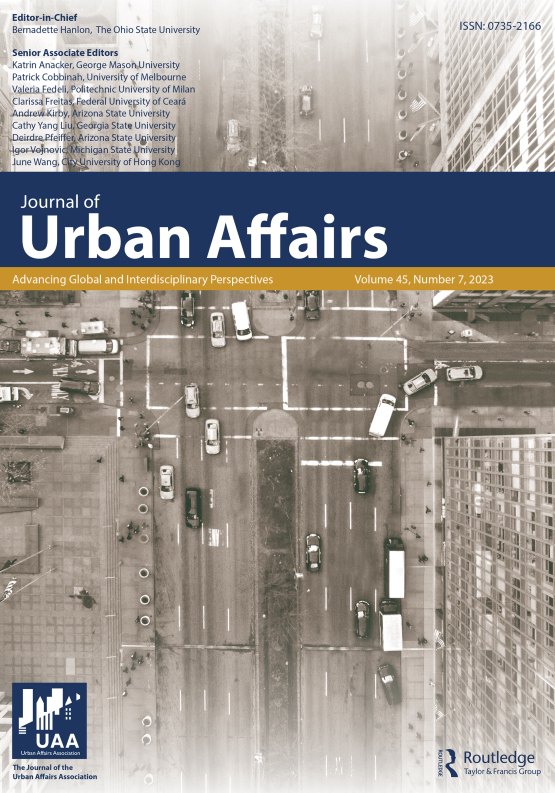Submit a Manuscript to the Journal
Journal of Urban Affairs
For a Special Issue on
Urban Energy Transition in South Asia
Abstract deadline
26 April 2024
Manuscript deadline
27 September 2024

Special Issue Editor(s)
Bérénice Girard,
French National Research Institute for Sustainable Development
[email protected]
Ashwini K Swain,
Sustainable Futures Collaborative
[email protected]
Marie-Hélène Zérah,
French National Research Institute for Sustainable Development
[email protected]
Urban Energy Transition in South Asia
In the coming decades, South Asia will play a significant role in worldwide urbanization. India's urban population is projected to increase by 416 million by 2050, while Pakistan's and Bangladesh's urban populations are expected to grow by more than 50 million each. Additionally, South Asia will be a major driver of global energy demand growth. These two foundational transformations of the 21st century – urbanisation and energy transition – are intricately interlinked. The urgency of climate action and domestic energy security requires to meet these growing demands from low-carbon energy sources and to move towards higher energy efficiency, especially in cities, where an increasingly significant amount of energy will be used. However, energy planning and governance have been historically dominated by national and regional actors. Energy seldom falls under the purview of urban local bodies, and electrical engineers often display little interest in urban issues. Despite a recent noticeable shift, the urban scale – cities as a sphere of shaping energy patterns – has largely been overlooked in energy social science research in South Asia.
We propose this special issue to understand the energy patterns in South Asian cities and their implications for urbanisation and national energy transition. We aim to critically examine the irenic notion of “transition” itself from the perspective of cities as spheres of mobilisation and action. We seek to focus on electrification and low-carbon energy deployment as well as the end-uses that drive the energy patterns, such as transport, cooling, heating, cooking, etc. We aim to cover the relationships, and potential paradoxes and contradictions, between the changes in energy systems and socio-spatial inequalities, and the related debate on energy justice. To capture the complex and interrelated urban-energy dynamics, we invite contributions on the themes suggested below.
(1) Rescaling the energy governance debates at the urban level: While urbanisation and energy transition have contributed to the emergence of new institutions and actors, both are largely state-led initiatives in South Asian countries backed by enabling regulatory policies and state-sponsored projects. We invite papers that examine consequential evolutions in the relationship between urban governance and energy governance, trans-sectoral nexuses (water-energy, waste-energy, etc.), and shifts in institutional architectures at the urban level.
(2) Energy demand and practices in urban South Asia: While urbanisation has been a key driver of national energy demand, the 21st century energy transition creates avenues for urban energy patterns. We invite papers that investigate the intersection between the deployment of distributed energy technologies and urban dynamics - how the changing dynamics of cities affect energy behaviours, coping mechanisms for grid unreliability or price inflation, and incentive structure for end-use. Paper proposals may also focus on specific technologies and/or programmes, barriers and incentives, their outcomes - what has worked, under what conditions -, and implications for institutional and governance capabilities of cities.
(3) Energy poverty, energy inequalities and energy justice in urban areas: Heterogeneity and divergence within South Asian cities require targeted interventions to ensure energy justice. We invite papers that focus on how the concept of energy justice is embraced by different actors (residents, NGOs, public actors) and/or how the notions of justice (distributive, procedural and recognition) are shaped at the urban scale. Paper proposals may focus on urban-centric schemes or initiatives targeted at alleviating energy poverty and ensuring equitable energy access, their challenges and potential for replicability.
(4) Energy providers and the production of urban spaces: Finally, we invite papers that examine the diverse range of energy providers (distribution companies, mini-grid operators, solar retailers, etc.) and how their activities impact the various scales of the urban, be it the building, the neighbourhood or the city as a whole. We are also interested in papers focusing on the sociological diversity of these actors and their daily practices, forms of energy provision, and relationship between urban spaces.
For consideration in the special issue, authors are invited to submit 500-word abstract via email by April 26, 2024. Please send the abstracts and any inquiries about the appropriateness of contribution to Guest Editors, Bérénice Girard at [email protected], Ashwini K Swain at [email protected] and Marie-Hélène Zérah at[email protected]. Guest Editors will review abstracts and invite scholars to submit draft manuscripts on June 30, 2024. Final manuscript due September 27, 2024.
Looking to Publish your Research?
Find out how to publish your research open access with Taylor & Francis Group.
Choose open accessSubmission Instructions
For consideration in the special issue, authors are invited to submit 500-word abstract via email by April 26, 2024. Please send the abstracts and any inquiries about the appropriateness of contribution to Guest Editors, Bérénice Girard at [email protected], Ashwini K Swain at [email protected] and Marie-Hélène Zérah at[email protected]. Guest Editors will review abstracts and invite scholars to submit draft manuscripts on June 30, 2024. Final manuscript due September 27, 2024.
Please do not upload manuscripts to the JUA submission site.